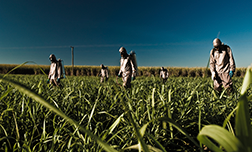Study Finds Occupational Link in Kidney Disease Epidemic among Sugarcane Workers.
 Sugarcane workers in northwestern Nicaragua experienced a decline in kidney function during the harvest, with field workers at greatest risk, suggesting that heat stress or other occupational factors may be playing a role in the high rates of chronic kidney disease in the region, a new study led by School of Public Health researchers shows.
Sugarcane workers in northwestern Nicaragua experienced a decline in kidney function during the harvest, with field workers at greatest risk, suggesting that heat stress or other occupational factors may be playing a role in the high rates of chronic kidney disease in the region, a new study led by School of Public Health researchers shows.
The study, published online in the International Journal of Occupational and Environmental Health, is a step toward identifying factors contributing to an unexplained epidemic of chronic kidney disease (CKD) in Central America that disproportionately affects young, male agricultural workers.
SPH researchers have been working since 2009 to uncover the causes of the epidemic, which has claimed the lives of at least 20,000 people in Central America in the last two decades. The illness is not related to diabetes or hypertension—the most common drivers of kidney disease in the United States.
The research team recruited 284 Nicaraguan sugarcane workers performing seven different tasks. They measured urine albumin and serum creatinine and estimated glomerular filtration rate—markers of kidney function—both before and towards the end of the harvest season. Workers were queried on the quantity of water and electrolyte solution packets they consumed during a typical workday. The mean age of the workers was 33.6; most were men.
The researchers found that kidney function declined during the six-month harvest season and varied by job category, and that workers with longer employment duration had worse kidney function. Over the harvest season, the decline in kidney function was greatest among seed cutters, irrigators, and cane cutters—jobs that require strenuous labor in a hot and humid environment. The results provide evidence that one or more risk factors for the disease are occupational, the authors said.
The research team said that inadequate hydration also might play a role. While there was no effect of water or electrolyte solution consumption on kidney function among all workers, the study did find a protective effect of electrolyte solution consumption among the cane cutters—workers who have the heaviest workload.
The results are “consistent with the hypothesis that heat stress and dehydration may play a role in (kidney disease),” the researchers said. They said further study is needed to directly measure workers’ exposures to heat and dehydration, rather than using job categories as a surrogate exposure measure.
The study did not find support for the hypothesis that agricultural chemicals are a causal agent for kidney disease. Instead, among field workers, agrichemical applicators, who have the most direct contact with chemicals, were found to experience the smallest decline in kidney function.
Still, the authors said, “Agrichemicals are used extensively in the region and widely believed among community members as the cause of the epidemic.” They noted that in September 2013, El Salvador’s National Assembly voted to ban 53 agrichemicals due to the perceived link to CKD.
“Agrichemicals, therefore, remain an important hypothesis and warrant further study,” the researchers wrote.
The research team is now planning a new study to quantify exposure to heat and agrichemicals among manual laborers, including sugarcane workers, in Central America, and to determine whether those exposures are associated with kidney injury.
Authors on the study from SPH included: Rebecca Laws, a doctoral student in environmental health; Madeleine Scammell and Michael McClean, associate professors of environmental health; and Daniel Brooks, associate professor of epidemiology. Researchers from Tufts Medical Center, VA New York Harbor Healthcare System and Department of Medicine, Universidad Autónoma de Madrid, and Yale University contributed.
Funding for the study was provided by the Compliance Advisor/Ombudsman (CAO) of the World Bank Group and the Comite Nacional de Productores de Azucar. The CAO managed all funds and maintained the contract to conduct the research.
Submitted by: Lisa Chedekel